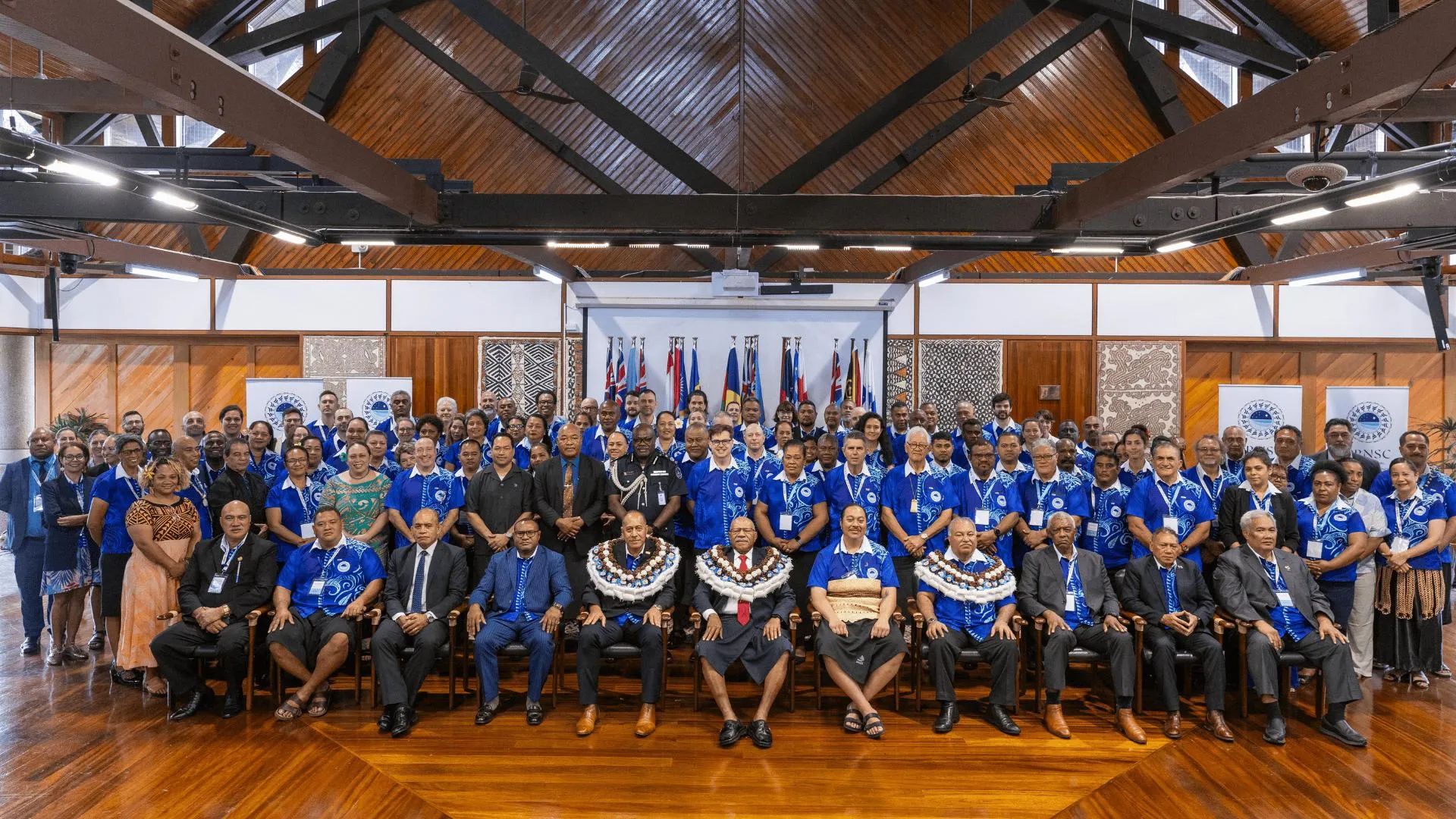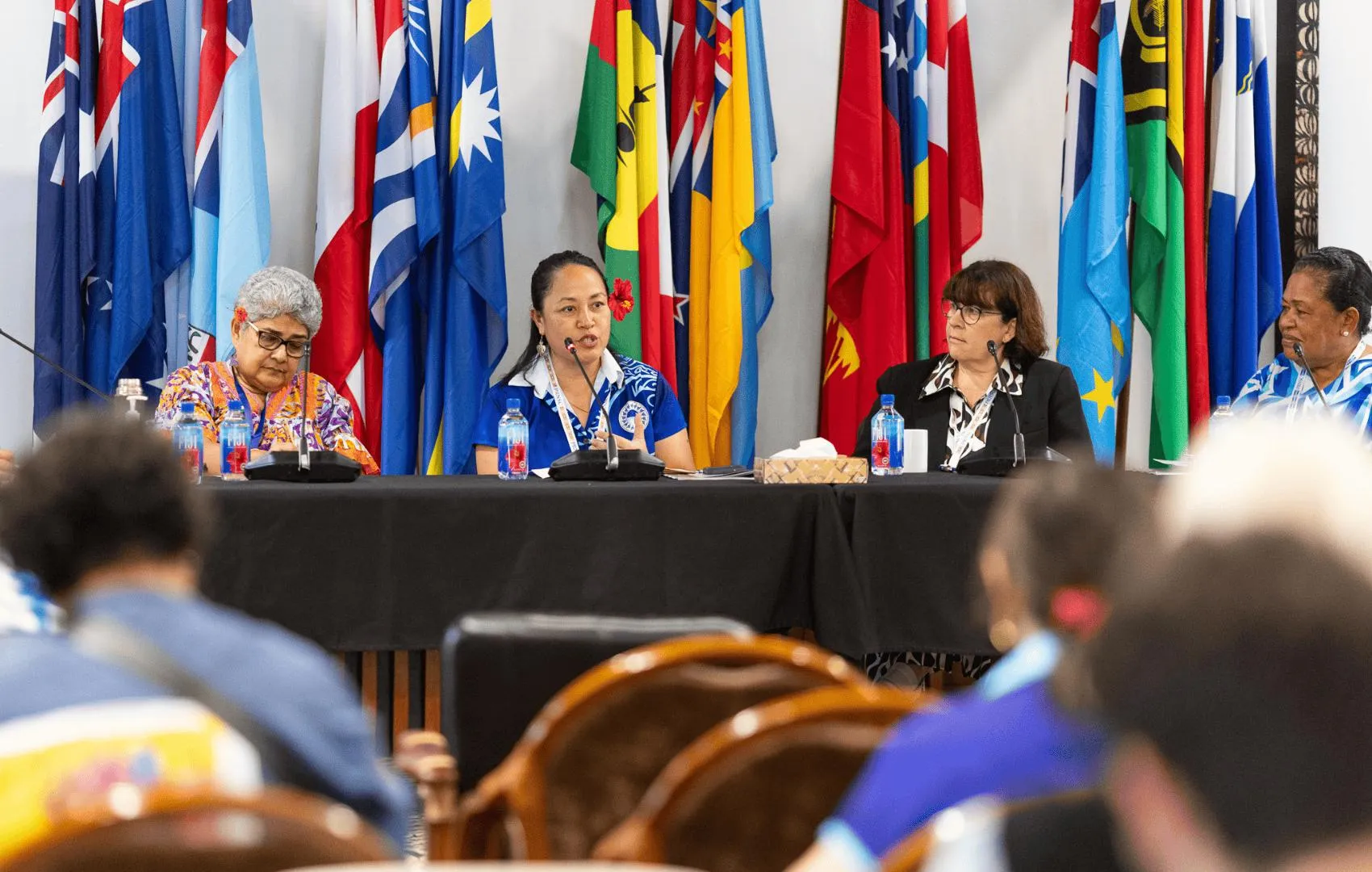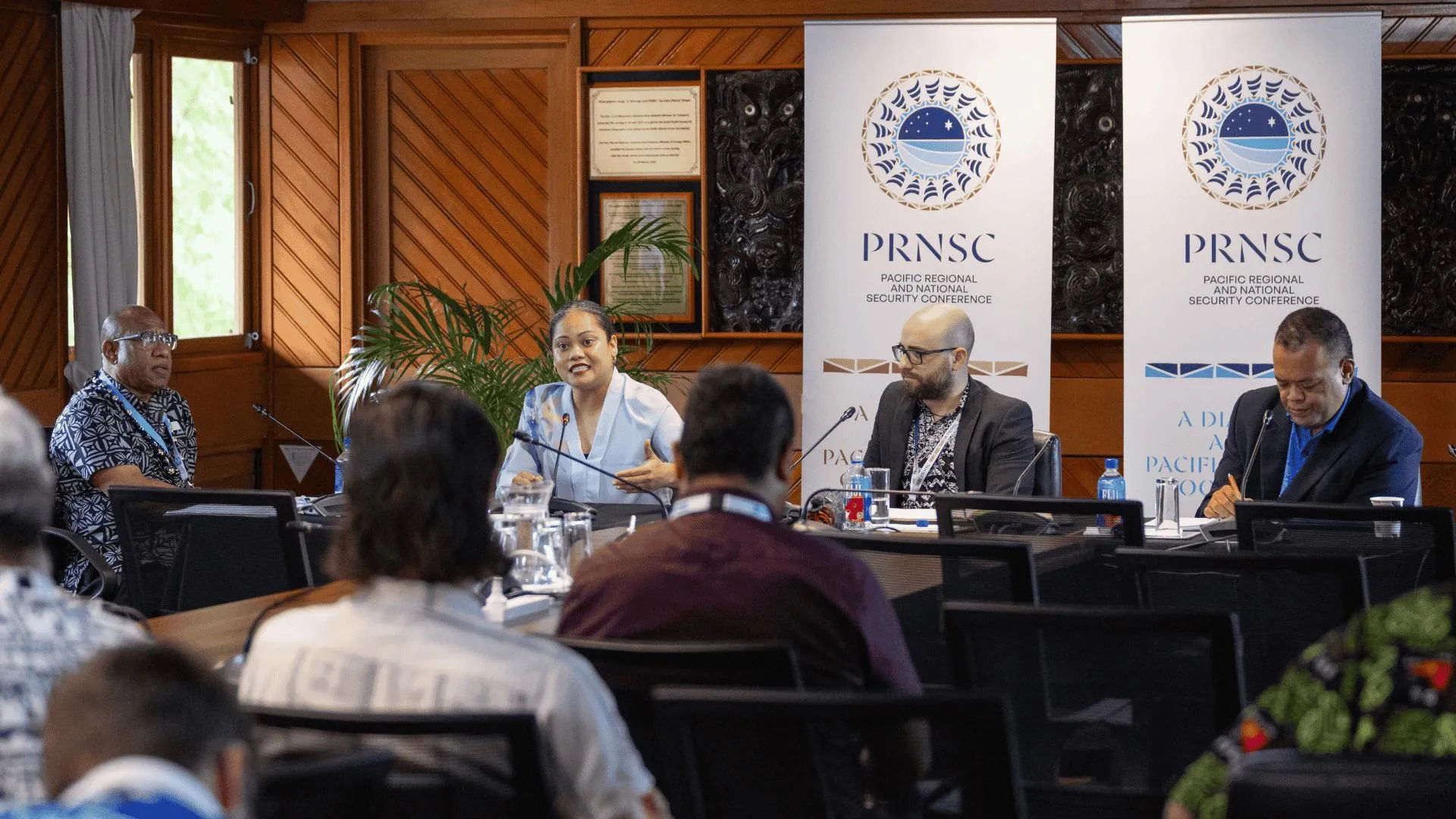Regional unity means ‘singing the same hymn’ with global partners
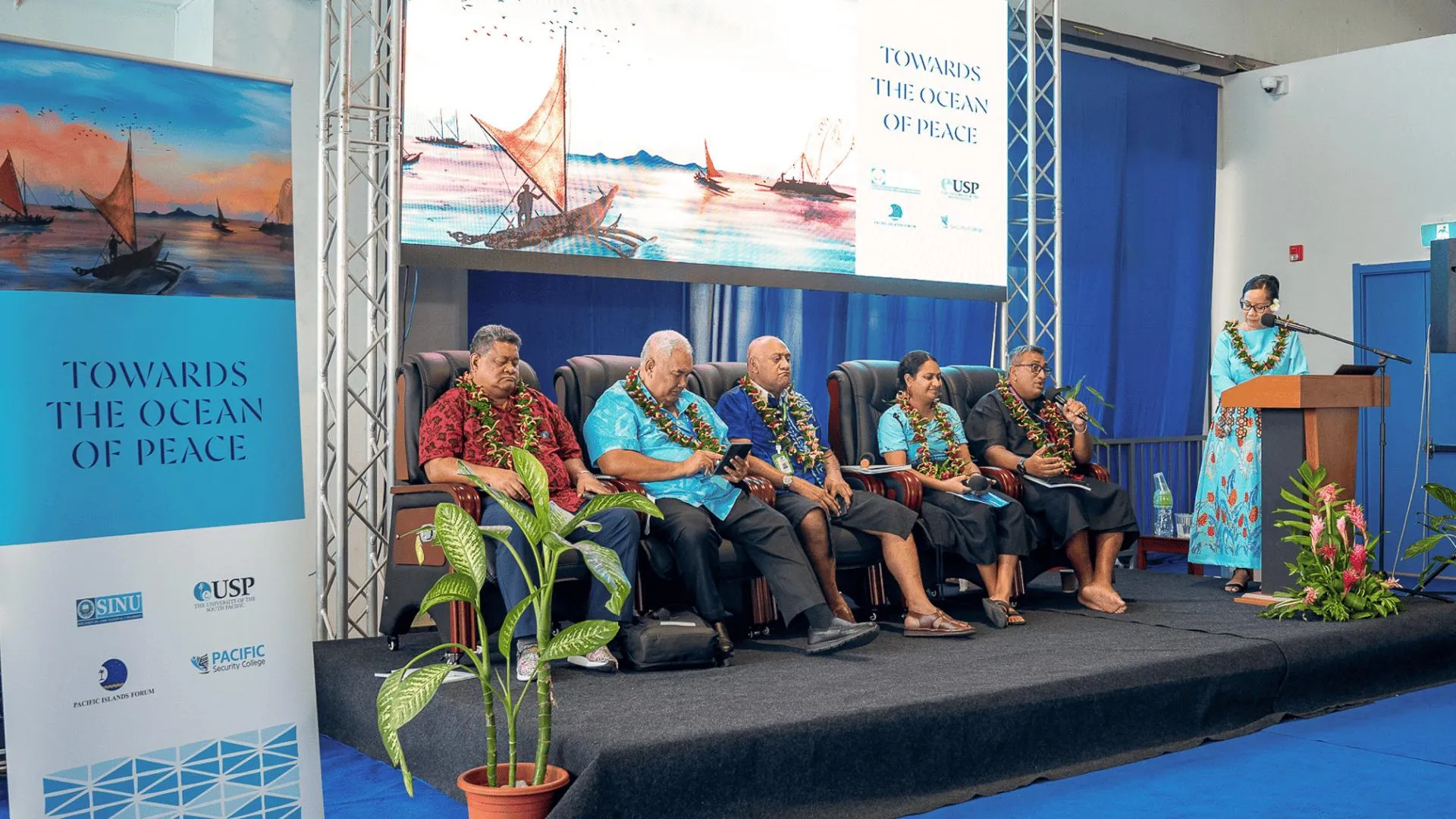
The Building an ‘Ocean of Peace’ through Strengthened Regional Integration panel session at the 54th Pacific Islands Forum Leaders’ Meeting in Honiara, Solomon Islands. Photo: Pacific Security College
In the wake of the historic adoption of the ‘Blue Ocean of Peace Declaration’, representatives from government, regional organisations and civil society have likened the vision of peace to a shared hymn – one the region and partners must learn to sing together.
At Building an ‘Ocean of Peace’ through Strengthened Regional Integration – a side event at the 54th Pacific Islands Forum Leaders’ Meeting in Honiara, Solomon Islands – speakers emphasised the importance of regional and international collaboration to bring the Ocean of Peace vision to life.
They highlighted how the Blue Ocean of Peace Declaration can unite the region in tackling shared challenges such as climate change, ocean degradation and geopolitical tensions, and called for stronger partnerships, greater involvement from young people, and Pacific-led solutions.
Palau’s Minister of State, the Honourable Gustav Aitaro, acknowledged the significance of the Declaration, which was adopted by Forum Leaders on Wednesday.
“The ocean connects all of us, so it’s our responsibility to ensure that we provide peace and security to our communities,” Minister Aitaro said.
“It’s very important at this time that we come together… We’re all Pacific Island brothers and sisters, and we’ve proven it.”
Minister Aitaro also stressed the importance of cooperation with international partners, noting “we cannot do this alone”, and suggested they should sign the Declaration next year.
“External partners should also understand, they should also learn that they are also responsible to be with us on this path towards peace and keeping peace in the Pacific.
“Anything that happens outside of the Pacific, we suffer the most. We emit the least, we suffer the most. And if there’s a conflict somewhere, we suffer by inflation. So, everything that happens outside of us is affecting us, maybe tenfold.
“In order to have our dialogue partners understand, we have to show them the leaders have spoken. They have spoken on behalf of their people, their community, their youth, their faith-based organisations. That’s why they signed on to the Declaration.
“The Declaration should be disseminated to all our dialogue partners and development partners to understand that the region is concerned, and now they have spoken. And they should follow our rules, and those rules are not only ours, they will be their rules as well.
“We’re not restricting, we’re open – that’s the Pacific Way.”
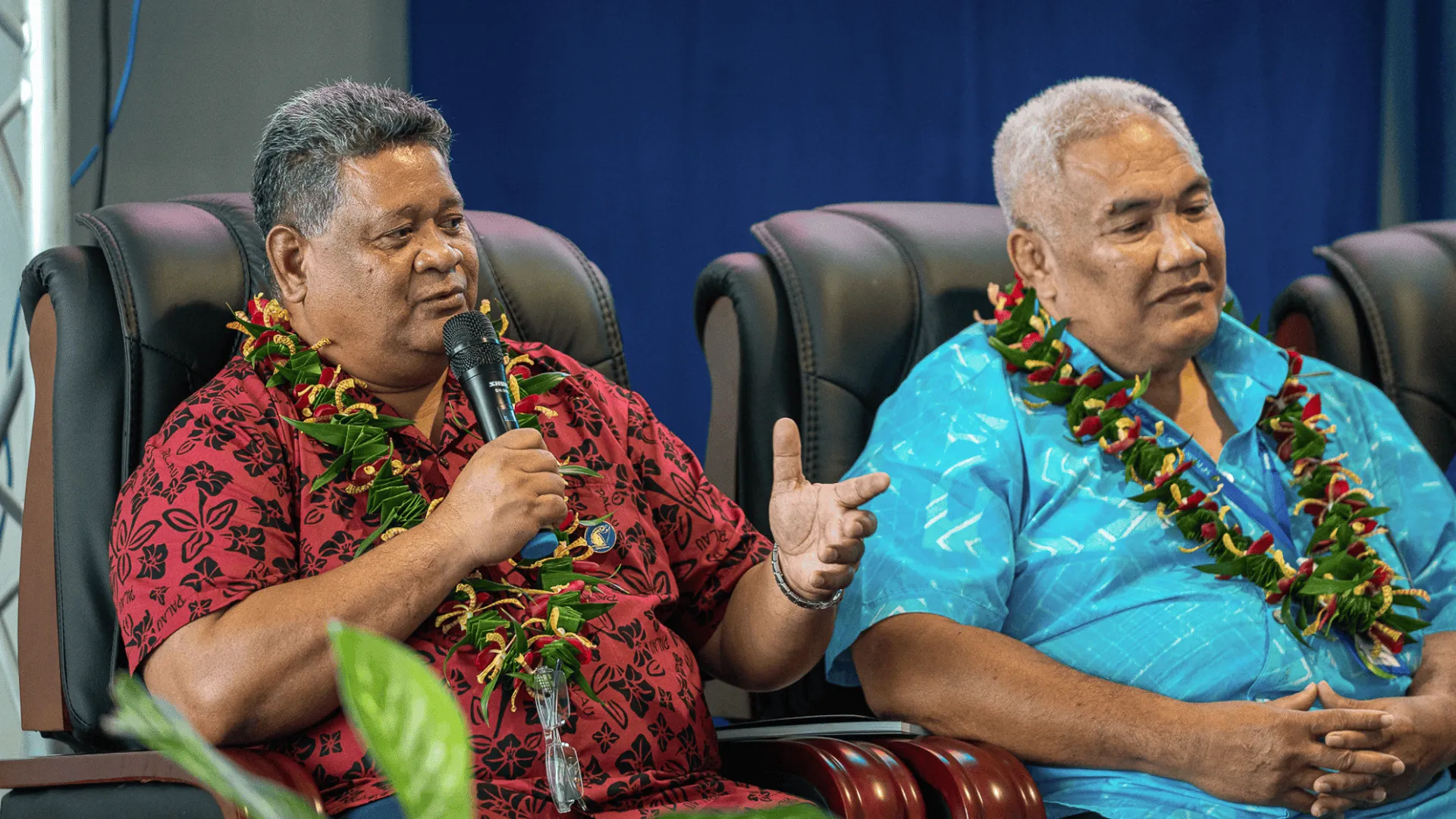
Palau’s Minister of State, the Hon Gustav Aitaro (left) and Cook Islands’ Minister of Foreign Affairs and Immigration, the Hon Tingika Elikana. Photo: Pacific Security College
Cook Islands’ Minister of Foreign Affairs and Immigration, the Honourable Tingika Elikana, said the Pacific faces numerous challenges, including climate change and geopolitical tensions. He highlighted that collaboration and proactive support from global partners is key to addressing these issues in the region.
“Without the support and the resources of our development partners, we will face a very difficult task. To be blunt, if there is a war in the Pacific, we don’t have any navies, we don’t have armies. So how are we going to respond?” Minister Elikana said.
“We have to rely on our partners, and so we need to ask the question of them: what is peace for you in our Pacific region?”
Minister Elikana drew on a poignant analogy to highlight the need for partners to listen closely and align with Pacific-led visions, so they can move forward in step with the region’s priorities.
“We have composed a lot of hymns here in the Pacific. We have the Biketawa hymn. We have the Boe hymn. Now we have the Ocean of Peace hymn and that’s a reflection of the work that our leaders, our region has done. Now our young people have just composed something which our leaders also sing with, which is the advisory opinion. It shows what’s happening in our region, how we come together to drive these issues,” Minister Elikana said.
“The difficulty is, when we take these hymns to sing with other partners, while we are singing according to the hymn that we compose, they seem to be singing a different tune and then the hymn doesn’t sound nice.
“We need to sit down with our partners so we learn the same song, we learn the same definitions of what is an Ocean of Peace, so we can all sing together in harmony, not only for regional peace, but for world peace.”
Pacific Ocean Commissioner, Dr Filimon Manoni, observed that, in 2025, the Pacific has “mobilised in numbers” to deliver a strong and unwavering message to the global community about what must be done to secure peace in the region, and about the kind of legacy leaders must leave for future generations.
“We take leadership, we contribute to the global discourse. We influence decisions that come out of global forums, because if you stand aside, your voice is not heard, your contributions are not heard, and then a decision passes you by.
“As leaders, that would not be the ideal situation. The stakes are too high for us not to be taking this kind of approach in our discussions around the ocean.”
Dr Manoni described the Ocean of Peace declaration as “an umbrella concept” of the kind of peace the region is striving for; the platform upon which other vital initiatives and treaties – such as the Treaty on the Prohibition of Nuclear Weapons and the Honiara Declaration – can stand upon.
“The ocean is the lifeblood of many of us in the Pacific – 75 per cent of national budgets are from our oceanic resources,” Dr Manoni said. “The synergies around the work we do with our ocean and the Declaration of the Ocean of Peace are very, very clear.”
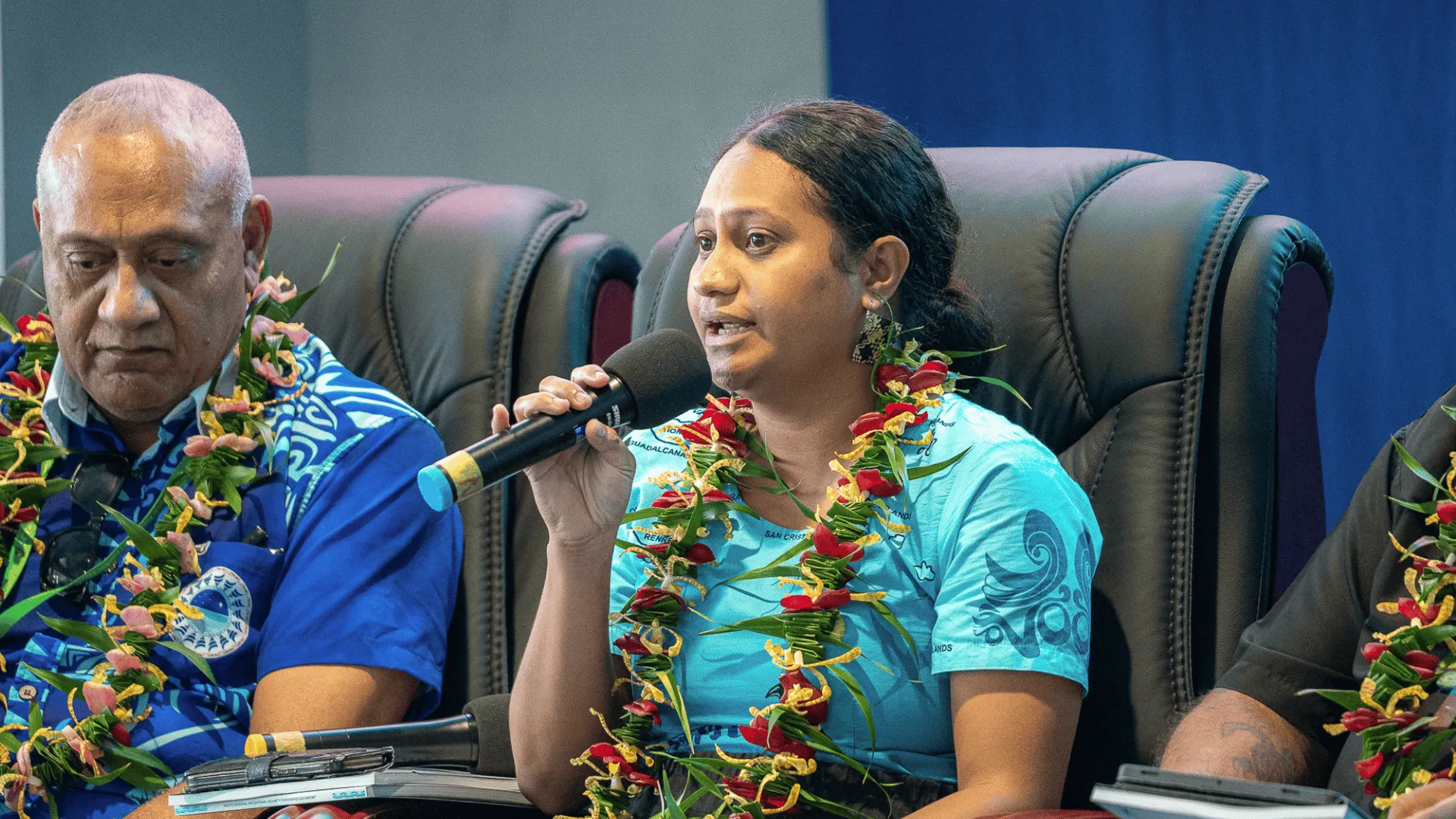
Pacific Ocean Commissioner Dr Filimon Manoni (left) and General Secretary of the Solomon Islands National Youth Congress Ms Josie-Anne Ashley. Photo: Pacific Security College
General Secretary for the Solomon Islands National Youth Congress, Josie-Anne Ashley, called for leaders to look inwards at issues affecting the region, in addition to focusing on the bigger picture globally.
“How can we make sure that our children go to school without interruption? Or how can we create a healthy environment which is free from contamination, and our families have enough food to eat?” Ms Ashley said.
“How can we make sure our local communities adapt to the rising sea levels and other environmental changes that are hitting us? For [young people], it’s these things that are real and more urgent.”
Reverend James Bhagwan, General Secretary, Pacific Conference of Churches, urged leaders to ground the Ocean of Peace in the everyday realities of Pacific people.
“The test for an inclusive Ocean of Peace is practical. It’s just a simple question: will this declaration ensure that life and dignity is improved for our market women, our young people, persons with disabilities, and our maritime families, and if not, then it’s not peace, it’s publicity,” he said.
“So we have to get serious about this, and we need to put people before geopolitics. We need to honour customary land and ocean rights, which require free, prior, informed consent every time. We need to prioritise locally led solutions.”
Panel moderator Dr Manumatavai Tupou-Roosen, from the University of the South Pacific, said the Ocean of Peace Declaration “affirms the Pacific’s identity as a region of peace”.
“[A region] where our ocean binds us together as one family, and where our unity is our greatest strength in responding to the challenges of the world.”
Following the panel discussion, Professor Dave Peebles, Director of the Pacific Security College, launched the Pacific Regional and National Security Conference 2025 Report.
The report captures the insights from one of the largest gatherings of the Pacific’s security community, including the outcomes of a futures workshop on the Ocean of Peace.
“The futures report was really looking at how we can be an Ocean of Peace in 2050. There were so many good ideas for what we can do in the next few years and the next few decades to make that possible,” he said.
“I think one of the themes of the report really is the hunger for closer regional ties, and that’s been reflected in today’s discussion.”
Building an ‘Ocean of Peace’ through strengthened regional integration was presented by the Solomon Islands National University, the Pacific Islands Forum Secretariat, the University of the South Pacific, and the Pacific Security College.
